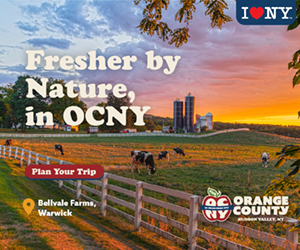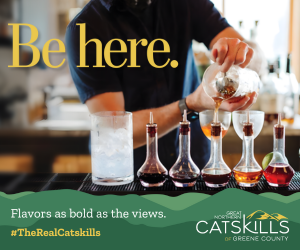When Michael Dorf opened the iconic New York City music venue The Knitting Factory in 1987, he had no idea that more than 30 years later he would be operating a winery out of a literal knitting factory. “To be able to say that I actually bought a knitting factory feels very karmic,” says Dorf. Even more incredible is that the winery is located in a historic mill powered by water from the Wallkill River, which enables this location to be a “net-zero” energy user.
The former “Montgomery Mills, Knitting Wear” building on Factory Street is now known as City Winery Hudson Valley, a destination for big-name musical events, weddings, dinners, and day trips.
City Winery has become synonymous with high-profile musical acts and wine made on-premise. With locations in New York City, Chicago, Atlanta, Nashville, Boston, DC, and Philadelphia, it was a pleasant surprise for Hudson Valley residents when Dorf decided the bucolic town of Montgomery, NY, would be the newest locale. Set along the river and surrounded by twenty-two acres of rolling hills and vineyards, and home to a few bald eagles that soar overhead, the scene is idyllic.

City Winery Hudson Valley is the only winery that uses hydro-generation from a watermill for electricity. “We can power the whole facility—from the winemaking to cooking, and even our live music,” says Dorf. “It makes the whole story feel better.” The energy within the mill is powered by water from the Wallkill River, which is stored in a man-made dam. Watermills are essentially large water wheels that are turned by the flow of water. A shaft connected to the wheel axle transmits power from the water through a system of gears and cogs. The use of hydro-generation at City Winery Hudson Valley can power the entire facility and then some. “Our three turbines, once completed, will generate 1.3 million kilowatt-hours (kW) of electricity per year and we only use 600 kW of that,” exclaimed Dorf. “We can then sell excess energy back to the grid.”
Being sustainable isn’t just a happy accident that occurred when buying the Montgomery property. Dorf is committed to sustainability in all of the City Winery locations. “We are a business based in agriculture. Wildfires and climate change affect the grapes we source,” says Dorf. “At a base level, without attention to preserving our planet’s resources, we don’t have a product.” Across the eight locations, Dorf goes above and beyond to reduce the carbon footprint of his businesses. He is striving for zero plastic use—even persuading staff to use canteens and providing them for performers backstage, as well. He uses LED lights and keeps conscious of kilowatt-hours used. In urban locations, visitors are encouraged to take public transportation and bike, and to carpool to the Hudson Valley location.
The most aggressive action City Winery has taken to be sustainable is by forgoing bottling and serving wine straight from the barrel. “We save 1.5 million bottles per year across all City Wineries using this system,” says Dorf. “Glass burns fossil fuels, and while cork is renewable, it’s over-used.” Even at his Central Park SummerStage Wine Garden and the Yankee Stadium stand, all the wine comes straight from a keg.

The commitment doesn’t stop there. Major consideration is put into the way the wine is made. “We strive to make wine in a natural, healthy manner,” says Dorf. “Our main winemaker, David Lecomte, has been with us for almost 12 years and his big thing is the integrity of winemaking. It’s easy to take shortcuts and make a cheaper wine where the grapes are mass-produced and chemicals are added, but the practices used are not good, and consumers don’t see behind the scenes.” Dorf and Lecomte buy mostly biodynamic and organic grapes, sourcing from California’s Alder Springs in Mendocino, Bacigalupi in the Russian River Valley, and Bertinelli Estates in Rutherford, and chose them specifically because of their vineyard practices. “We looked at what kind of spray and fertilization was being used and at the quality of the grapes,” says Dorf. “We wanted grapes that made it easy to make a natural product with as little intervention as possible.” Dorf is even trying his hand at wine growing, by planting some rows of Vidal Blanc onsite in Montgomery.
In the kitchen, the Hudson Valley provides the agricultural bounties. All of the vegetables and meats are sourced locally. Honey, bread, and other goods are also obtained from neighboring farms, and herbs are grown onsite. While they have begun growing vegetables, it will be a while before they will be used in the kitchen. “You can’t get more local than your backyard, but we are just getting our sea legs on what we can grow to support our kitchen,” says Dorf.

With restrictions lifted in New York, Dorf is excited to get events and concerts up and running. “Being just a winery owner is something I can’t do,” Dorf explains. “My expertise is to entertain around winemaking. I have confidence that we can provide a safe place to drink wine, eat, and listen to music.” The stage, surrounded by vineyards with a backdrop of the Wallkill River, will host artists like Rhett Miller, Southside Johnny, Joan Osborne, Amy Helm, Jorma Kaukonen, and The Weight in the Concerts in the Vineyard Series starting June 6th through mid-October. Dorf is adamant when it comes to safety and will incorporate the use of pod areas to keep social distancing. As restrictions go down further, the number of attendees will scale upwards.
Enjoying music, wine, and conviviality at City Winery Hudson Valley is a great way to reconnect with friends and family safely and in an environmentally-friendly way. One might say Dorf is bringing a “tight-knit” community even closer.
Photos: City Winery





